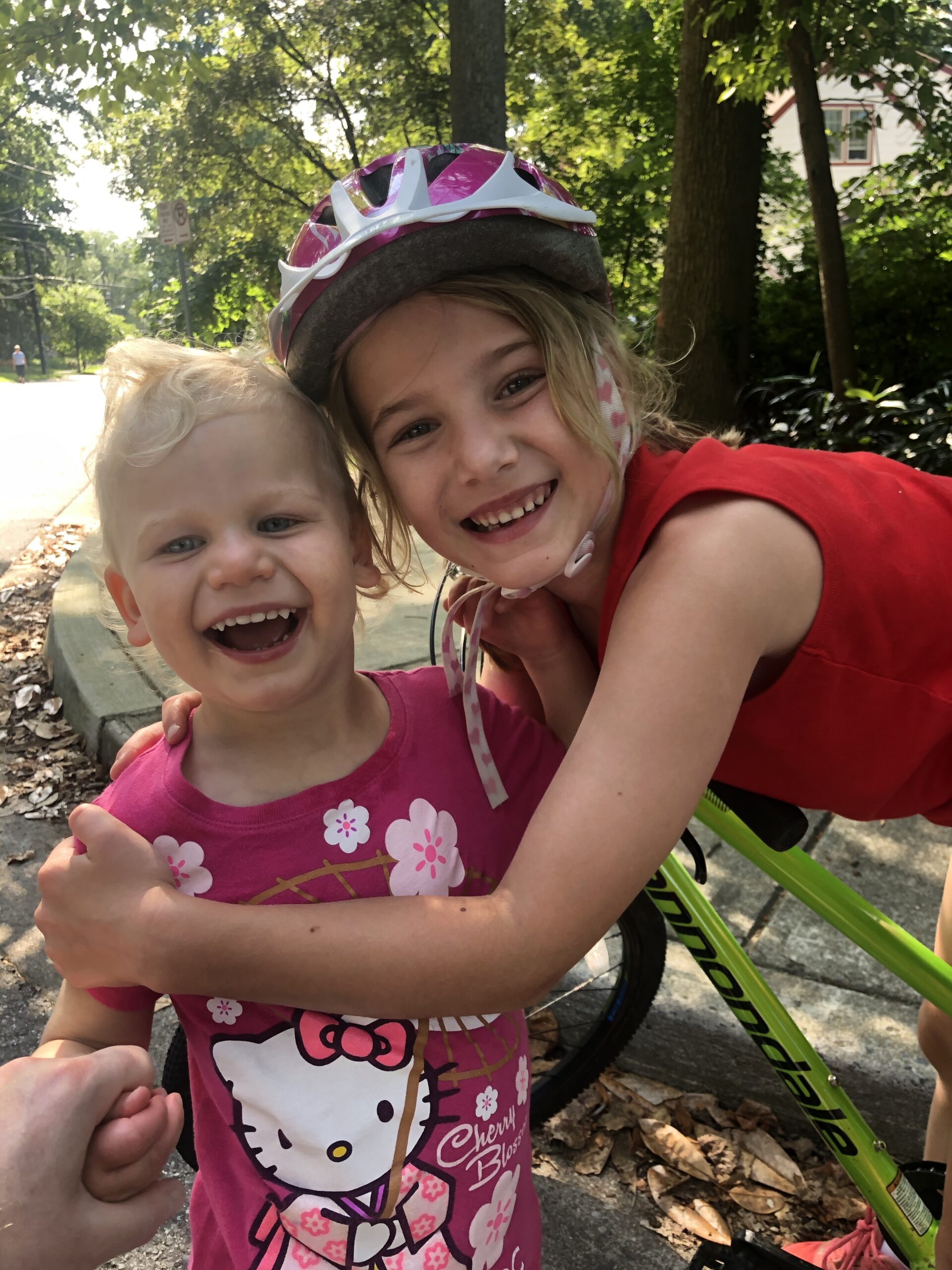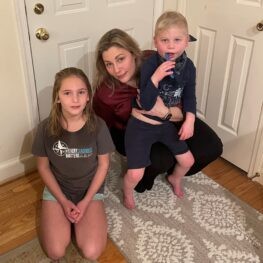Christina Hartman is no stranger to the world of science and medicine, but she was like any other parent when she was confronted with the reality that her child had a rare disease.
“I had some of the world’s top doctors on speed dial, and was able to obtain connections to clinicians in all the specialties we needed,” said Christina. “What we found was that there were more unanswered questions than anything.”
Christina’s younger daughter Charlotte was born in 2016. Charlotte’s pediatrician started seeing developmental delays around the time she was six months old, and at around a year she was diagnosed with a global developmental delay, and the diagnostic journey began in earnest. They were seeing specialists at Children’s National Hospital and were fortunate to live close and have access to the NIH (National Institutes of Health) in the Washington, D.C. area. Even with all of these medical resources within their reach, and with Christina’s knowledge of the healthcare system, getting answers for Charlotte’s developmental delays was difficult.
Charlotte was fortunate that Montgomery County (Maryland), where her family lives, did an assessment, and determined that she needed physical therapy, occupational therapy, and speech therapy based on her developmental delays, and without an exact diagnosis. However, the severity of Charlotte’s symptoms meant she needed more intensive therapy than the county could provide.
Fortunately for Charlotte, both Christina and her husband are highly educated and are able to command compensation that allows for full-time care-taking for Charlotte. Not everyone has access to these therapies, or has the education and resources to ensure access to diagnosis or therapies, and without early and intense therapeutic intervention, many children like Charlotte don’t achieve their best possible outcomes.
While coordination of care and multiple EHR systems lacking interoperability remain a challenge, the world-class expert clinicians at Children’s National Hospital have been fundamental in Charlotte’s care and diagnosis. Her diagnosing medical geneticist connected Charlotte with a private physical therapist who Christina credits with getting Charlotte ambulatory. This same medical geneticist oversaw her diagnostic odyssey, and ultimately sought a WES (whole exome sequencing analysis). In September 2018, despite insurance not approving coverage of the test, Christina, her husband and Charlotte had their blood drawn for trio-based whole exome sequencing, and by December 2018, the family had a diagnosis.
Charlotte was finally diagnosed with a NAA10-related disorder, which is ultra-rare, with only around 100 people worldwide diagnosed. The disorder was a result of a de novo genetic mutation. Though a treatment did not exist, early therapeutic intervention with treatment was key, as was having her adaptive needs met before she was even diagnosed. Starting physical therapy before Charlotte even had a diagnosis may be why she is ambulatory today. That’s not always easy to accomplish since insurance providers don’t always approve therapies without a diagnosis. Even after Charlotte’s diagnosis, due to a shortage of providers accepting insurance, Charlotte’s family had to pay out of pocket for speech therapy, and reimbursed for only a portion of the cost.
Even with a diagnosis, new symptoms are constantly appearing, and leave the healthcare professionals that are working with Charlotte and her parents puzzled. Among Charlotte’s care team are an NIH-funded researcher with an M.D. and Ph.D., doing a national history study, the head of neurogenetics at Children’s National Hospital who is her lead clinician, and many, many more specialists, pediatricians and therapists.
“She doesn’t have control of her body. She drinks from a sippy cup. She can’t go up or down steps. She can’t use a fork. She is still in diapers. But she is still the happiest little girl you will ever meet. She loves people, she loves going to school. She’s got the biggest smile on her face when the bus pulls up every morning. She loves meeting new people.” Christina shared, “At the heart of it, she is a happy little person who gets frustrated sometimes because she can’t speak. She tries to, but she can’t form the words because the brain and body don’t connect well enough to let her communicate.”

Sophie & Charlotte Hartman. Charlotte’s older sister, Sophie, is 10 years old, and is a great big sister, independent, and very protective of Charlotte.
Christina has worked in health policy for her entire career. She has a bachelor’s degree in politics and biology from Catholic University of America and a master’s degree in public health with a focus on epidemiology from George Washington University. She started her career at the CDC, then worked for the Department of Health and Human Services, and the Pew Charitable Trusts. While with Pew, she worked to get the GAIN Act passed in 2011, which provided incentives for the development of novel antibiotic drugs.
After Charlotte’s diagnosis, Christina moved into the rare disease world in 2018. As the Senior Director of Advocacy & Policy at EveryLife Foundation for Rare Diseases, she worked with Global Genes on the Rare on the Road program to get advocates, patients and caregivers with rare diseases to Capitol Hill for Rare Disease Week. She joined the board of directors at Global Genes in January 2021.
While Christina was working with The Assistance Fund (TAF), she pushed to increase access to transformative therapies, including novel cell and gene therapies. She shared that according to the NIH, 95% of diseases do not have an FDA-approved treatment. Because of genomic sequencing, new diseases are constantly being discovered, so the discovery, development, and eventual patient access to emerging transformative therapies is critical.
Christina’s experience with Charlotte’s diagnostic journey informed her work with TAF. The Precision Medicine Answers for Kids Today Act was introduced to Congress last fall. If signed into law, this will expand access to genomic sequencing, and will allow clinicians to have discretion to decide what type of genomic testing is needed to get a diagnosis.
“You have to get a diagnosis. You can’t successfully treat a disorder if you don’t know what it is. The companies that are developing treatments for these diseases need to know and understand the entirety of their patient population,” Christina said. “You can’t adequately develop a treatment if you don’t know what your patient population looks like. It’s so critical to have the diagnosis and know what the patient population is.”
Christina is currently the Head of U.S. Government Relations for Alliance for Regenerative Medicine, which is the leading international advocacy organization dedicated to realizing the promise of regenerative medicines and advanced therapies, including gene therapy, gene editing, cell therapy, and tissue-based therapy. Christina is proud of the work that she does to represent the regenerative medicine sector, for public health, and within the rare community.
“You need to have something you can contribute when there are so many things you can’t control,” she said. “You can’t predict what’s going to happen with your kid, so that’s why we have to create a society that accommodates those with rare disease.”

Christina Hartman with her daughters, Sophie and Charlotte

Stay Connected
Sign up for updates straight to your inbox.
